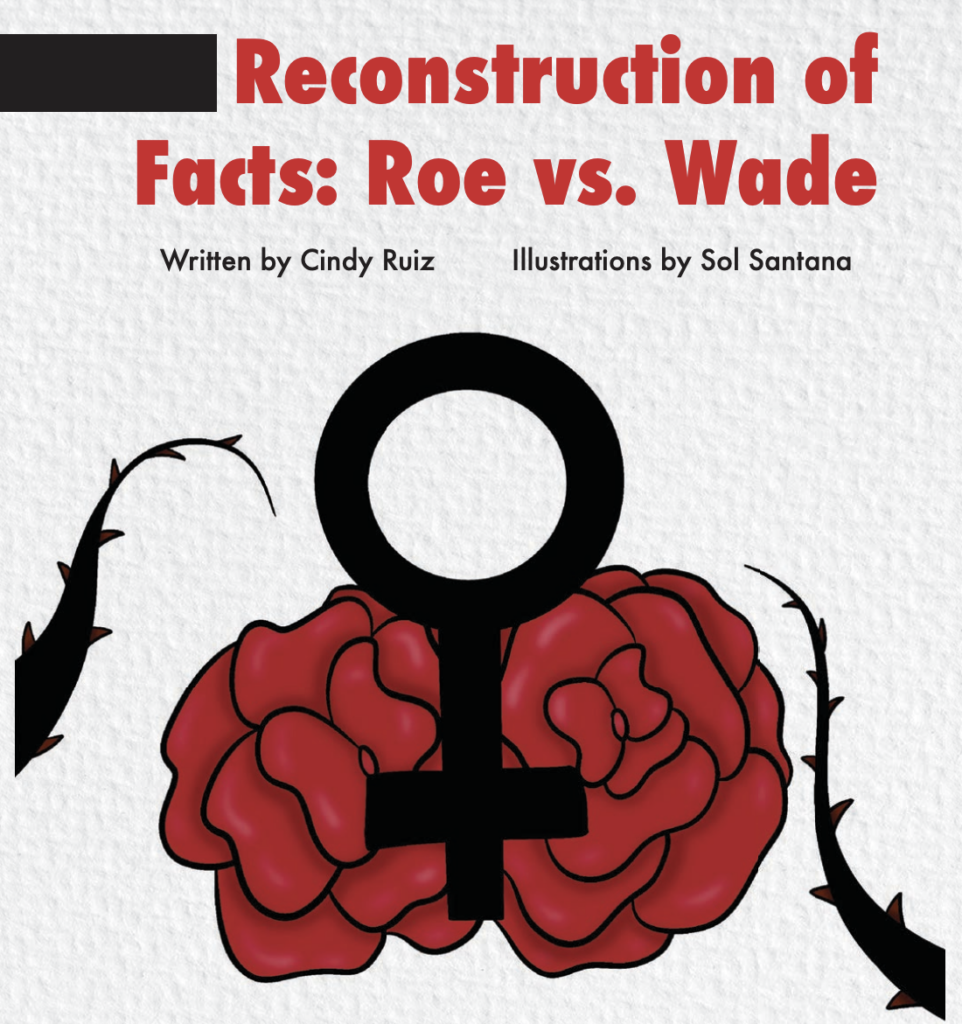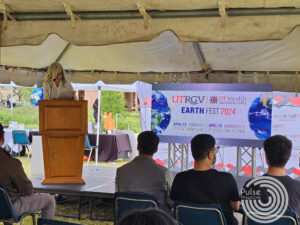Reconstruction of Facts: Roe vs. Wade

Illustrations by: Sol Santana
Students, families, and people in all 50 states have remained worried since the Supreme Court of the United Students (SCOTUS) overturned Roe v. Wade in 2022
The overturning caused several protests around the United States, including the Rio Grande Valley. But:
What the duck was Roe v. Wade?!
According to Thirteen, Roe v. Wade was a legal case that began in 1970 when Linda Coffee and Sarah Weddington sued District Attorney Henry Wade on behalf of Jane Roe, a single woman who tried to get an abortion. She could not get the abortion because Texas law did not allow abortions unless a woman’s life was in danger and a doctor ordered it.
Roe won the case after the SCOTUS voted 7-2 in her favor on Jan. 22 1973. In the majority’s opinion, which Justice Harry Blackmun delivered, Texas statutes violated her constitutional rights to privacy and choice under the first, Fourth, Ninth and Fourteenth Amendments. The court added that states may not regulate a woman’s decision to get an abortion during the first trimester as only a pregnant woman and her physician should decide.
The court’s controversial ruling signaled the beginning of abortion’s decriminalization. The decision let victims who got pregnant from rape decide whether to keep pregnancies that resulted from the crime to prevent being further traumatized. Roe v. Wade represented a chance to get safe abortions legally and prioritized women’s health. However, abortion was not always a controversial issue in the United States. According to the Organization of American Historians (OAH), before the mid-19th century, getting an abortion was only illegal if it occurred after quickening (not feeling the fetus move). It was a misdemeanor under British common law, applicable in colonial America. The anti-abortion movement also did not start on religious or moral grounds. Instead, it began in 1857 when medical doctors under the American Medical Association (AMA) wanted to stop unregulated abortion providers like midwives and have more control of the medical profession.
The association, whose members were all male, argued that life medically began at conception and not after quickening. The AMA pushed for legislation to ban abortions and succeeded in getting some restrictive laws passed in most of the country between 1860 and 1880. This did not stop some doctors from providing abortions and more abortions were performed during the Great Depression and continued through the 20th century. However, because abortion was illegal, several doctors were prosecuted for performing it.
These prosecutions created a hidden abortion system that sometimes had deadly consequences, such as women dying from carrying out self-abortions or lack of proper care. The Guttmacher Institute found that between 1930 and 1960, illegal abortions caused about 4,900 maternal deaths.
Religiously, the National Council of Catholic Bishops later took on the fight against abortion through its National Right to Life Committee, which a few people from other religious and non-religious groups joined. Though the movement did not succeed in stopping abortion reform in all states, it was successful in getting some states to keep
But some religious groups did not agree with the anti-abortion movement. According abortion-rights to YouGov statistics, Jews are most likely to identify as abortion-rights (77%), while Protestants and Mormons are primarily identified as anti-abortion (57% and 69%, respectively). However, the dominant groups that identify as atheists and agnostics (81% and 66%). Nevertheless, religion still plays a role in abortion conversations because 51% of Americans who practice a religion believe abortion should be illegal in most or all cases, according to a YouGov study in 2022.
Abortion finally took the national center stage in 1973, when the SCOTUS announced its Roe v. Wade decision. Despite making abortion legal nationwide, anti-abortion groups have succeeded in creating restrictions since 1973 such as to get parental consent and criminalizing abortions in the second trimester. Then on June 24, 2022, almost 50 years after Roe v. Wade, the SCOTUS reversed the 1973 decision in a 6-2 vote. While decades-old opponents celebrated the ruling, supporters feared the worst.
Here come the consequences, consequences, consequences.
Currently, several states such as Texas, Oklahoma, Alabama and Louisiana have passed some of the most restrictive laws on abortion, including prohibiting abortion in cases d rape and incest. But is there really anything to fear?
Of course there is. Pregnant women losing their health privacy, the possible overturning of certain civil rights legal precedents such as Obergefell v. Hodges (which gave same sex couples the right to marry), Lawrence v. Texas (the right of same-sex couples to have consensual sex) and Griswold v. Connecticut (the right to buy and use contraceptives) the risk for medical providers and fake crisis pregnancy centers are just some of the many consequences we should fear.
For example, Justice Clarence Thomas said, “In future cases, we should reconsider all of this Court’s substantive due process precedents, including Griswold, Lawrence, and Obergefell,” after Justice Samuel Alito’s 78-page opinion came out.
According to National Public Radio (NPR), period-tracking apps are also at risk because they could be used to find those who had an abortion or might consider one. With more than 57 million women and girls using apps like Clue, Flo and Magic Girl to track their periods and fertility windows, sensitive intimate information is available to process arrests and sentences.
Then there is the increased risk to medical personnel like doctors and nurses who provide abortions. Although Roe v. Wade was legal according to the OAH, extremist anti-abortionists attacked abortion, clinics and personnel. There were 153 assaults, 383 death threats, three kidnappings, 18 attempted murders and nine murders of medical personnel between the early 1980’s and 2000’s.
These attacks have not stopped. In 2021, according to the U.S DEpartment of Justice, there were two violent attacks on abortion centers using molotov cocktails. Forbes magazine also reported that crimes against abortion providers, including stalking, physical assault, and hoax devices, have increased 600% since Roe v. Wade was overturned. Many anti-abortionists still stand outside abortion clinics in states that allow abortions, using those who go in not to terminate a pregnancy and give babies up for adoption instead.
Now, we are facing new challenges. Cases such as Marlena Stell’s, a YouTuber who carried a dead fetus for two weeks after suffering a miscarriage because of the abortion ban in Texas, show us some of the negative consequences of overturning the ruling. According to the Texas Tribune, medical doctors can also refuse to provide medical attention that requires an abortion to patients because they could lose their medical licenses if they are reported for doing so.
According to Drs. Luis and Lucas Espinoza, who are brothers with doctorates in sociology, having a miscarriage can be dangerous. According to Luis, an abortion is “a medically controlled miscarriage from a legal standpoint, and it’s less harmful to the body than if you actually have a miscarriage, for example, at home.” Lucas added that having a miscarriage. at home is dangerous because “it would cause more trauma to your physical body. Your body goes through trauma. It’s more scar tissue. So it actually feels like it’s not pushing out everything at once.”
Both scholars challenged the belief that abortion is a form of birth control. Luis said, “I would say 99% of people don’t want to have an abortion. According to a medical doctor, only 1 of 15 women use it as a form of contraception.” Lucas explained, “Getting an abortion is very costly. It’s cheaper to use a condom. It’s cheaper to use birth control.” Both advised that people considering an abortion should make an “informed decision” for themselves.
The Feminist Wave of the Century
The fourth wave of feminism has created a lot of changes today, thanks to movements like #Metoo and the abortion-rights movement. The abortion-rights movement has its roots really attached to the feminist ideology, starting with the right for unmarried people to get contraceptives in 1972 in the case of Eisenstadt vs. Baird. How do feminists see the overturning of Roe v. Wade?
Dr. Rosalva Resendiz is a sociologist and associate professor at the University of Texas Rio Grande Valley who has taught social justice, gender, crime and justice, peace, nonviolence and justice, and criminology for 20 years. Resendiz has a doctorate in sociology. She described herself as a abortion-rights, Chicana indigenous woman who is a “second-class citizen,” which means she is more likely to be discriminated against or pushed aside because of her gender, race and skin color, according to dictionary.com.
What’s your general view of the Roe v. Wade case?
“I’m very much against the overturning of Roe v. Wade; I am abortion-rights. I believe in, and everything I teach is based on, human rights. So, from the human rights perspective, the overturning of Roe v Wade is a violation of my human rights.”
What was your reaction to the news of the overturning?
“It was really traumatizing. I remember waking up that day and seeing the news and it felt as horrible as when Trump won because I knew that my rights were dissipating. That instead of moving forward to being, you know, equal to men in this country, my rights are disappearing as a second-class citizen, as it is already threatened as a Chicag Indigenous Person. I’m already a second-class citizen.”
What’s your professional opinion about abortion rights?
“Everybody has a right to decide for themselves. So yeah, I mean, I believe very strongly in human rights. I think every single individual has a right to decide for themselves, has a right to decide what to do in their lives to make their lives better. And the choices, you know, should be theirs always. So if my colleague chooses to have children, great for them. It’s their choice. They choose not to have children, great for them. That’s their choice.
I don’t need any of the males in the university talking to me about my reproductive system. It is none of their business what I do with my life. So professionally, disagree on those things. But, the basic thing is that there should be boundaries. I don’t need to know, you know, your religious beliefs.” we can
Don’t lose sight. Keep up the fight
What are your thoughts related to the abortion laws in the country?
“The MAGA Republicans have pushed an agenda and they’ve been very successful in it. The more they push against women, because remember, white women were the first to get voting rights, right? So they’re pushing against white women to not even have a right to have to choose an abortion.
That means that the black people, you know, we’re gonna have less rights. So they’re willing to take rights away from the white women in their lives. They’re gonna continue to do it to the rest of us more, because as it is, as a brown person, I still have to fight twice as hard to be noticed or to be acknowledged as an equal in the university system.”
What is your opinion about anti-abortion groups’ reactions to the overturning?
“This country supposedly was based on the idea of freedom of religion, separation of church and state. And I think that’s where people forget that liberal philosophers who they they also have a separation of church and state, you know, the idea of science, that logic and reason, which we’ve […] progressively moving forward for more rights in changing the, you know, the global system with more progressiveness. But with this assault, with this strong Christianity movement, we’re losing [more] rights. It’s really sad.”
What about the concerns related to the overturning of other civil rights (same-sex marriage, contraceptives, etc.)?
“In some parts of the country in some states, that’s already happening, you know, and it’s horrible. And, of course, the same-sex marriage luckily, it did pass through the Senate already. So that has been codified as you know. They have to recognize same-sex marriage regardless.
Even if the state doesn’t allow it they have to recognize a federal law in another state anyway. So that has made a great impact to safeguard the rights of same-sex couples. Yeah. So there’s a fight still there. I mean, the country is really divided. I just wish people would understand that their religious beliefs are not supposed to be part of legislation.”
Overall, the overturning has affected different groups in different ways around the nation. More decisions are waiting to be taken. Speeches are waiting to be made and more topics need to be discussed. Agreements and disagreements are going to happen. In the end, it always depends on the people.








